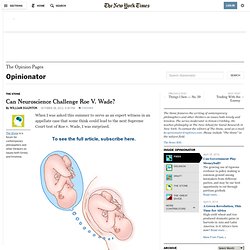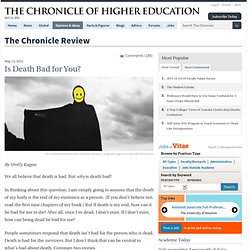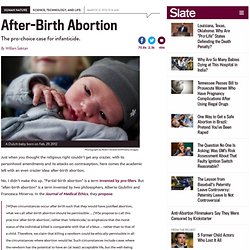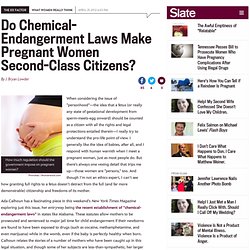

Can Neuroscience Challenge Roe V. Wade? The Stone is a forum for contemporary philosophers and other thinkers on issues both timely and timeless.

When I was asked this summer to serve as an expert witness in an appellate case that some think could lead to the next Supreme Court test of Roe v. Wade, I was surprised. Rick Hearn is the attorney representing Jennie McCormack, an Idaho woman who was arrested for allegedly inducing her own abortion using mifepristone and misoprostol — two F.D.A. -approved drugs, also known as RU-486 — and for obtaining the drugs from another state over the Internet. While the case against Ms. The authors of a 2005 review of clinical research in the Journal of the American Medical Association have written, “Evidence regarding the capacity for fetal pain is limited but indicates that fetal perception of pain is unlikely before the third trimester.”
As Mr. The turn to legislation based on alleged neuroscientific findings in search of an end-run around the protections provided by Roe v. Leif Parsons.
Science at Issue in Debate on Morning-After Pill - NYTimes.com. Is Death Bad for You? - The Chronicle Review. By Shelly Kagan We all believe that death is bad.

But why is death bad? In thinking about this question, I am simply going to assume that the death of my body is the end of my existence as a person. (If you don't believe me, read the first nine chapters of my book.) But if death is my end, how can it be bad for me to die? People sometimes respond that death isn't bad for the person who is dead. Story 1. Story 2. Story 2 is worse. In thinking about this question, it is important to be clear about what we're asking. Maybe nonexistence is bad for me, not in an intrinsic way, like pain, and not in an instrumental way, like unemployment leading to poverty, which in turn leads to pain and suffering, but in a comparative way—what economists call opportunity costs.
Despite the overall plausibility of the deprivation account, though, it's not all smooth sailing. If death has no time at which it's bad for me, then maybe it's not bad for me. After-Birth Abortion: The pro-choice case for infanticide. Photograph by Robin Utrecht/AFP/Getty Images.

Just when you thought the religious right couldn’t get any crazier, with its personhood amendments and its attacks on contraception, here comes the academic left with an even crazier idea: after-birth abortion. No, I didn’t make this up. “Partial-birth abortion” is a term invented by pro-lifers. But “after-birth abortion” is a term invented by two philosophers, Alberto Giubilini and Francesca Minerva. In the Journal of Medical Ethics, they propose: [W]hen circumstances occur after birth such that they would have justified abortion, what we call after-birth abortion should be permissible. … [W]e propose to call this practice ‘after-birth abortion’, rather than ‘infanticide,’ to emphasize that the moral status of the individual killed is comparable with that of a fetus … rather than to that of a child.
Will Saletan writes about politics, science, technology, and other stuff for Slate. Follow Predictably, the article has sparked outrage. Chemical-Endagerment Laws: Are Pregnant Women Second-Class Citizens? When considering the issue of “personhood”—the idea that a fetus (or really any state of gestational development from sperm-meets-egg onward) should be counted as a citizen with all the rights and legal protections entailed therein—I really try to understand the pro-life point of view.

I generally like the idea of babies, after all, and I respond with human warmth when I meet a pregnant woman, just as most people do. But there’s always one vexing detail that trips me up—those women are “persons,” too. And though I’m not an ethics expert, I can’t see how granting full rights to a fetus doesn’t detract from the full (and far more demonstrable) citizenship and freedoms of its mother. Ada Calhoun has a fascinating piece in this weekend’s New York Times Magazine exploring just this issue, her entryway being the recent establishment of “chemical-endangerment laws” in states like Alabama.
“It starts with cocaine, and then it’s cigarettes and alcohol.